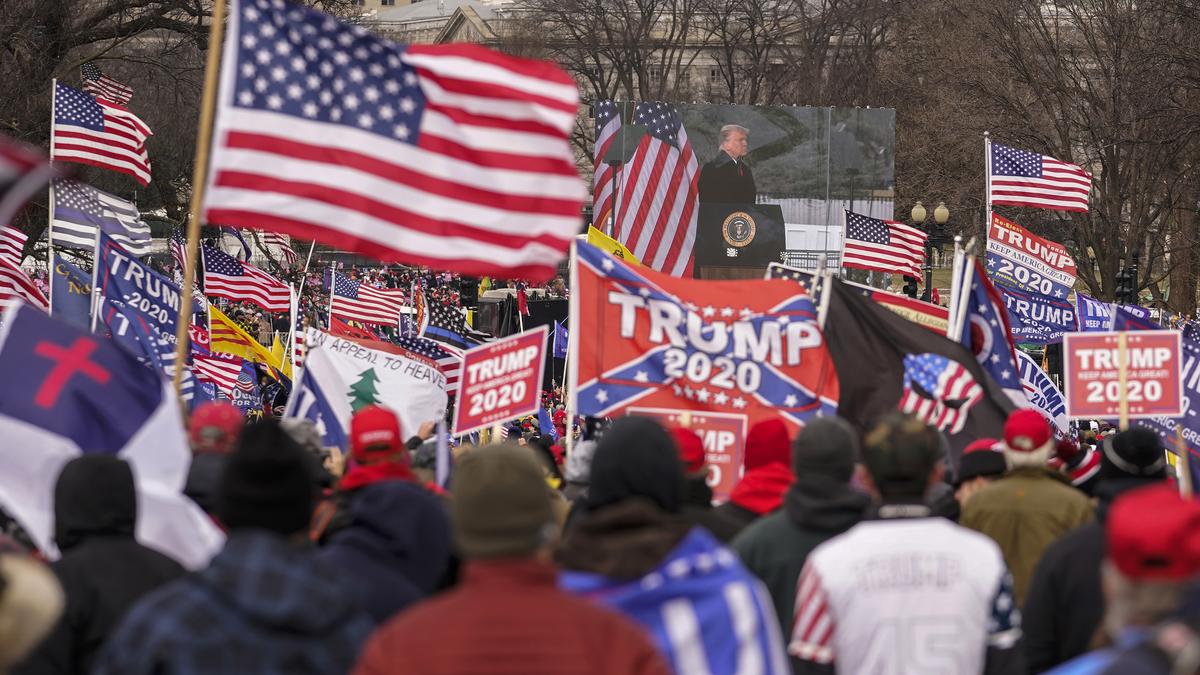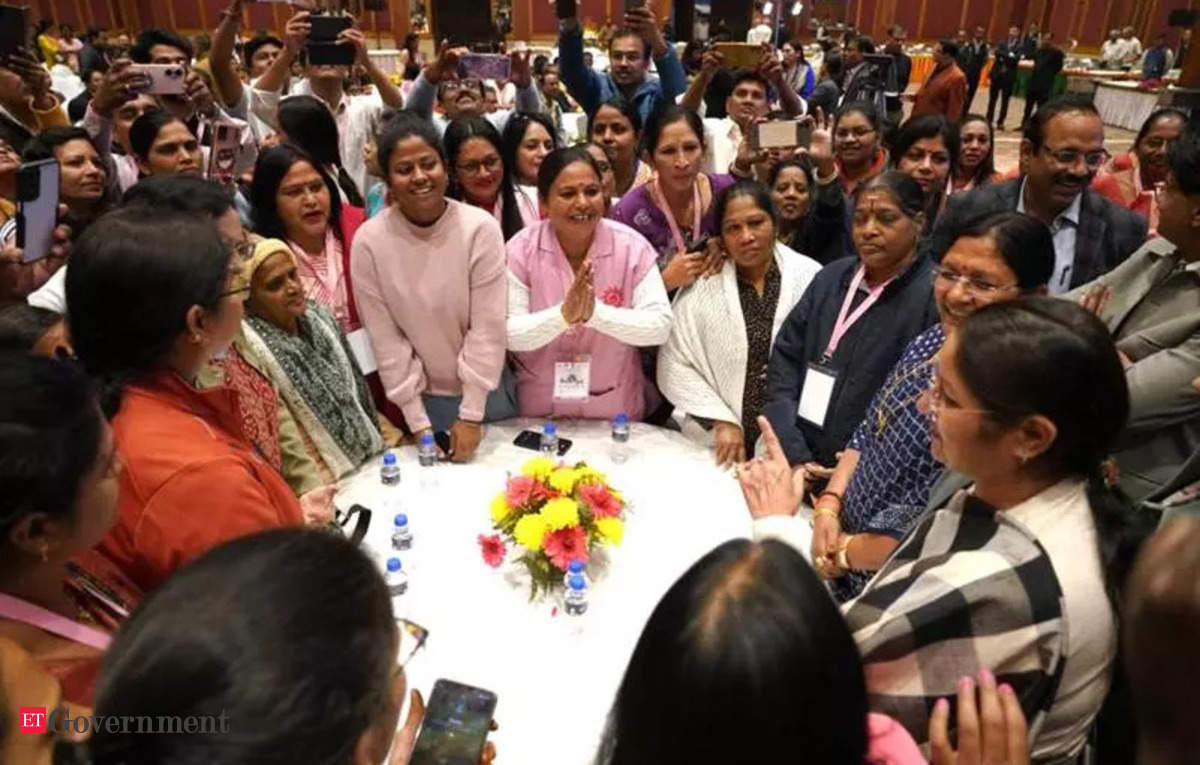
Donald Trump, the Republican presidential nominee for 2024, presents a concatenation of contradictions. His transition from New York businessman to the President of the United States, from a thrice-married TV celebrity to the poster child for white evangelical Christians, came as a surprise to many.
Mr. Trump was convicted last month by a New York court on 34 felony counts in a trial involving hush-money payments to adult film star Stormy Daniels. He was found to be liable for the sexual abuse of a New York woman in 1996. In 2016, Mr. Trump was also the only GOP candidate with a history of casino ventures and two divorces, as well as allegations of sexual misconduct — one of them affirmed by a civil court verdict.
To a bystander, his actions may seem incongruous with the norms of Christianity. Indeed, of late, his reluctance to take a hardline stance on abortion and some support for Kamala Harris among Evangelicals may be challenging his sway. A recent poll by EWTN News/RealClear Opinion Research revealed that the vice president was polling ahead with Catholics, a key denomination of Christians. While Mr. Trump is being supported by 42.7% of Catholics, Ms. Harris is seven points ahead, at 50.1% support.
However, he still maintains the lead among white evangelical Christians in America. According to a Pew Research Center poll in February 2024, two-thirds of white evangelical Christians had a favourable opinion of Mr. Trump; a Reuters/Ipsos poll in September 2023 showed that he beat out Vivek Ramaswamy and Florida Governor Ron DeSantis among this section of the public.
Several of the issues which are foremost for the Christian right— bans on abortion, curbing of LGBTQ+ rights, and protection of the traditional family structure— have found resonance in policies rolled out during the Trump years.
We look at the extent of and causes for support for Mr. Trump among the Christian right, and broadly look at how the Republican party has been intertwined with religious causes. How has the “faith, freedom and family” narrative affected American politics?
Also read: Kamala Harris, Donald Trump face off in final TV debate as America awaits next twist
The Christian support for Donald Trump
Multiple polls have shown that Mr. Trump enjoys a lot of support among Christian evangelicals, as compared to Mr. Biden, and now, with Kamala Harris. In the Pew Research Center poll mentioned above, among the two-thirds of white evangelical Protestants who have a favourable view of the Presidents, 30% have a very favourable opinion of him. Among other Christians, roughly half of White Catholics (51%) express positive views of Mr. Trump, as do 47% of white nonevangelical Protestants and 45% of hispanic Protestants.
Some have questioned whether the support for Mr. Trump comes from those who are Christian in name only, i.e., not practising Christians who attend Church regularly. This though, has not been proved true— among Christians as a whole, 47% of those who attend church at least monthly say they have a favorable view of the former president. This is comparable to the number of non-churchgoers who say the same— 46%. In fact, 23% of American adults with a favorable view of Mr. Trump are highly religious, including 11% who are highly religious white evangelical Protestants.
Interestingly, 18% of people with a positive view of Mr. Trump are religious “nones,” including 10% who are “nones” with low levels of religiousness. Culturally Christian people who do not follow any religion have a slightly more favourable opinion of Mr. Trump as compared to “nones” who are not Christian by birth or upbringing.
The persons who view Mr. Trump positively may not even believe that he is Christian. Just 8% of people who have a positive view of Mr. Trump think he is very religious, while 51% think he is somewhat religious and 38% say he is not too or not at all religious.

The basis of support
Support seemingly springs from the fact that Christians believe that the positions he takes are upholding their faith. Further, concerns were assuaged in 2016 by his Vice-Presidential pick, born-again evangelical Christian Mike Pence, who espoused strict faith-aligned views on abortion. This year, Mr. Trump has selected J.D Vance as his running mate; Vance converted to Catholicism in 2019 and has participated in numerous events dedicated to conservative Catholicism.
Further, Mr. Trump appointed conservative Justices to the Supreme Court and lower Courts, and thereby shifted the judificiary to the right. His three US supreme court justices helped repeal the nationwide right to abortion (enshrined in Roe vs Wade).
Mr. Trump, however, does not have the most stringent views on abortion himself, especially as compared to his Republican peers. He is pro- limiting abortion, but has refused to endorse a national abortion ban. His earlier record is even more chequered. In his days as a New York businessman, Mr. Trump was pro-choice; in a 1999 interview, he had said he was “pro-choice in every respect.”
While not a popular view among the religious right, Mr. Trump’s shifting stance reflects general attitudes: A USA Today/Suffolk University poll in June found that 80% of Americans oppose a federal abortion ban, including 65% of Republicans and 83% of independents, thus necessiating that Republican presidential candidates tackle the issue carefully. Even before the Republican primaries, candidates measured their words. At the Family Research Council’s Pray Vote Stand Summit last September,Vivek Ramaswamy did not mention abortion at all, while DeSantis mentioned his state’s six-week abortion ban in passing. Only Mike Pence touted a 15-week national standard.
Mr. Trump has also been viewed as espousing anti-trans, anti-LGBTQ views and as upholding the traditional family structure.
“On day one I will sign a new executive order to cut federal funding for any school pushing critical race theory, transgender insanity and other inappropriate racial, sexual or political content on our children,” he said in a rally in Cedar Rapids, Iowa. In an address to the National Religious Broadcasters convention, Mr. Trump said he would establish a federal task force to fight the “persecution against Christians in America” and “the toxic poison of gender ideology,” saying “God created two genders, male and female.”
(A Pew Research poll showed that only 7% of Mr. Trump supporters believed that “someone can be a man or woman even if that is different from the sex they were assigned at birth,” as contrasted to 60% of Harris supporters.)
Mr. Trump’s rise has also been attributed to a sort of Christian nationalism— the belief that America was founded as a Christian nation, particularly for Christians from Europe, and that Christian values should form the bedrock of public life and governance. “We will protect Christians in our schools and in our military and our government,” Mr. Trump said in his address to the National Religious Broadcasters convention. “We will protect God in our public square. … I will protect the content that is pro-God.”
During his rallies, too, Mr. Trump has often asserted that Christianity was under attack, and positioned himself as its saviour. The rallies use symbols and rhetoric associated with this belief. During his felony trial, he shared social media posts comparing himself to Jesus Christ. He supported the Bible being taught in schools in Louisiana; Louisiana recently became the first State to require that the Ten Commandments be displayed in every government school classroom.

Earlier this year, he launched his own brand of Bible, with each copy selling for $59.99. Besides this, he also endorsed a Bible edition which includes the founding documents of the nation as well as the lyrics to “God Bless the USA” by Lee Greenwood. According to Robert Jones, president of the Public Religion Research Institute, this is a Bible “specifically for a kind of white evangelical audience that sees themselves as the rightful inheritors of the country.” A 2023 poll by the Institute found that around half of white evangelicals agreed that God intended America to be a ”promised land for European Christians.
His message clearly has resonated among a section of the religious right that also believes that religion should be a core part of public life. In an updated Pew Research poll released in August 26, 2024, only 55% of Trump supporters believed religion should be kept separate from government policies, as contrasted with 87% of the supporters of Kamala Harris. At rallies, Trump supporters hold posters and wear merch with slogans like “Jesus is my savior, Trump is my president,” “God, Guns & Trump” and “Make America Godly Again.”
This belief in Mr. Trump has been beating other, arguably more traditionally religious candidates. According to a survey by Deseret News, Mr. Trump was perceived as a person of faith by 64% of the Republicans polled in the survey, while only 34% thought the same about Mitt Romney— a devout member of the Mormon Church. In 2016. Mr. Trump clinched the Republican presidential primary, even though he was challenged by the likes of Ted Cruz, a devoted member of Houston’s Southern Baptist Church, and Marco Rubio, who quoted the Bible regularly on his Twitter (now X). Tellingly, Mr. Trump won half the votes of weekly church-attending Republicans in 2016; Cruz got 30% while Rubio polled 11%.
Even this year, his nomination saw him beating Mr. DeSantis, who had been endorsed by evangelical leader Bob Vander Plaats, and other, arguably more religiously conservative Republican leaders, such as Kim Reynolds, the Republican governor of Iowa.
Religious objections to Trump
There are several religious detractors to Mr. Trump as well.
On the campaign trail, Mr. Trump has said that abortion should be regulated by States, and not at the federal level. “What I’ll do is negotiate so people are happy,” he said at a meeting in June. This invited the ire of pro-life groups such as Susan B. Anthony Pro-Life America, which has described the former President’s comments on a federal ban as a “morally indefensible position for a self-proclaimed pro-life presidential candidate.”
Some evangelicals have viewed his use of the Bible and prayer as a mere prop, indicating that he lacked real faith and displayed improper conduct.
Yet others believe that Christian values should guide voters, and that Mr. Trump does not have them. Evangelical pastor Doug Pagitt, co-founder of the organisation Vote Common Good, said that they were “trying to help religious conservatives understand it’s okay for them to let concern for the common good, and not allegiance to a political party, determine how they vote.”
Vote Common Good, an organization committed to engaging Christian voters, organised a series of events in Chicago earlier this year for Catholic, evangelical and young Black voters, as well as interfaith leaders. Mr. Pagitt and other leaders listed a range of liberal and progressive issues which line up with Christian teachings: affordable housing, fair wages, access to adequate health care, food security and common-sense gun reform.
A group called Evangelicals for Harris is seeking to drum up support for the Vice-President along similar lines, focusing on health care, environment and poverty. The group’s founder, Reverend Jim Ball, says that Jesus was focused on helping the vulnerable and that the important question is “whose policies are more in keeping with protecting the vulnerable and defending the vulnerable?”
Some evangelicals view abortion as a deal-breaker, but there are others who appreciate the questions being asked by Ms. Harris after the Supreme Court overturned Roe vs. Wade with its judgement in Dobbs, such as Presbytarian minister Reverend Lee Scott. “How are we then going to support new mothers? How are we going to put funding behind that?” ….And that’s a part of her [Harris’s] plan. I love that she wants to expand the child tax credit,” he said in an interview with NPR, noting that this would help people who may chose to abort a pregnancy over childcare costs.
Further, Mr. Trump’s base is also not as religious as presumed. A Politico article noted that Mr. Trump had a stong support based among Republicans who were not religious, and that he was not as dependent on the evangelical vote as is assumed.
In general, religiousity among Republicans is on the decline. In 2016, 39% of all Republican voters attended church less than once a year. In comparison, just 36% said that they attended religious services at least once a week. In 2008, 44% of Republicans reported that they were in church at least once per week. By 2022, that number had slipped to just 35%. In comparison, the share of Democrats who attended weekly only declined five percentage points (23% to 18%) during the same time period.
Some commentators say that the marriage of militant Christian conservatism and Trumpism, in fact, may have pushed some Christians away from conservative positions, and even the religion.
David Campbell, a political scientist at Notre Dame University noted that “an increasing number of Americans have an allergic reaction to the mixture of religion and conservative politics, including the MAGA movement.”
“This was true before the emergence of Mr. Trump and the MAGA movement but has accelerated since so many evangelical leaders have embraced Trump,” he said.
Not aligning with religion is not a new phenomenon— it saw an uptick in the 1980s and 90s, along with and as a reaction to the rise of the religious right wing. A study by Mr. Campbell and his colleagues found that people were more likely to say they did not have a religious identity after they read about a candidate belonging to the religious right.
Persons from other religions, even deeply religious ones, do not fall in as much with the Trump campaign. 80% of Black Protestants and 79% of Jewish Americans have unfavourable opinions of Trump. He also polls poorly among agnostics and atheists, with 88% of atheists and 82% of agnostics having an unfavourable opinion of Trump.

Republicanism and religion
The process of Republicanism becoming identified with religious conservatism has been gradual.
Historians have noted that at least part of the reason evangelicals aligned to the Republican Party was not religious at all, it was racialised.
In the 1954 case Brown v. Board , the U.S Supreme Court outlawed the segregation of public schools. White evangelical communities opened private schools to counter desegragation in public schools. States like Georgia also ordered the conversion of public schools into private ones, although such measures did not last very long. These communities framed their reason as an expression of religious freedom rather than upholding segregration. Elementary and secondary schools such as Jerry Falwell’s Lynchburg Christian School and colleges such as Bob Jones University became known as “segregation academies.”
After the Civil Rights Bill was passed in 1964, the IRS threatened to revoke tax-exempt status for many of these private schools if they did not cease their discriminatory admissions. Even once they ceased to be segregationist, some of these academies continued to espouse anti-miscgenation rules, thereby preventing intermarriage between different races. When their tax-exempt status was threatened, the institutions made common cause with the Republican Party, which also pivoted to align itself with their concerns.
Additionally, President Lyndon B. Johnson launched Great Society programmes to tackle racial injustice and poverty. Further, the Voting Rights Act was passed in 1965, allowing non-white American citizens the right to vote. This was framed as an attack on State autonomy, and as the government turning its back on white citizens in favour of Black and Latin Americans. In 1960, the Democratic party also nominated John F. Kennedy— a Catholic. In 1964, the Republican party nominated Barry Goldwater, who had an anti-civil rights platform.
This further pushed white southern evangelicals to the Republican party; critics included leaders like Reverend Falwell and Paul Weyrich..
Richard Nixon, a Republican, channelled this anger to his own cause. He used a “southern strategy,” to capitalise on the resentment of the whites in general and white evangelicals in particular. Nixon strategist Kevin Philips sought to bring the largest number of white ethnic prejudices into one party without fragmenting the existing coalition, arguing that this was key to political success. He noted that the more Black people registered as Democracts in the South, the more the white people would turn to the Republican Party.
The modus operandi was using gentle conservatism, using language of morality and decency, law and order, normalcy, family values, and self-reliance: regarded as evangelical values. Gradually, the Democratic Party came to be indentified as the party of big government and minorities of colour, while the Republican party became the homing ground for white evangelicals.
Another force which brought Christians, both evangelicals and Catholics, into the conservative fold is issues relating to gender roles and sexuality. There was, and is, opposition to sex education in schools. Opposition to homosexuality also unites several Christian denominations, as does the belief that there are two genders only, with defined traditional roles. The most controversial among these issues, however, is opposition to birth control and abortion. The Roe v. Wade Supreme Court decision motivated groups such as Moral Majority and Eagle Forum (started by Phyliss Schafly) in the 1970s and 1980s. Today, it remains a central issue for conservative organisations like Religious Roundtable, the Faith and Freedom Coalition, Council for National Policy, and Concerned Women for America.
Notably, abortion did not form a core part of the Republican party’s platform till the late 1970s. In fact, Republican voters were more pro-choice than their Democrat contemporaries, polls showed. During the Republican National Convention in Kansas City in 1976, less than 40% of the delegates considered themselve pro-life. But during the convention, the Party adopted a platform supporting an anti-abortion constitutional amendment; the goal was to increase the party’s appeal to traditionally Democratic Catholics— a temporary measure. However, social conservatives clustered around the platform, building a coalition of religious persons who were largely pro-life, driving out pro-choice Republicans.
This all transpired during Ronald Reagan’s dramatic 1976 primary challenge against President Gerald Ford. Abortion was earlier viewed as a Protestant cause that was in the best interest of middle-class women, doctors, and society. But the advent of feminism and the sexual revolution altered perceptions, making conservatives view abortion through the lens of “abortion on demand” by sexually liberated, culturally liberal feminists. This made Republicans more accepting of a pro-life platform, and saw the party gradually transform from a Protestant party into a Catholic and evangelical one. Anti-feminist rhetoric has also found favour among certain sections of this demographic, with the success of organizations such as the Concerned Women for America, the Moral Majority and the Christian Coalition after Ronald Reagan was elected President. It was women leaders such as Phyllis Schafly who were pivotal in ensuring that the Equal Rights Act was not passed.
A curious linking of racial desegregation to communism, which was viewed as a major attack on American values, and a belief that America was meant to be a land for European Christians have also contributed to a white, Christian nationalism. Sociologist Samuel Perry notes that in the 80s, organisations such as Moral Majority promoted the idea that the US was being “attacked by internal forces” which ran counter to Christian, biblical principles. The idea that secularism was “evil, even demonic,” also lasted throughout the presidential terms of George W. Bush, when the religious right was more powerful than ever, Perry writes.
“What has changed is a very real sense of demographic and political threat,” he adds.
Published – September 10, 2024 04:13 pm IST



